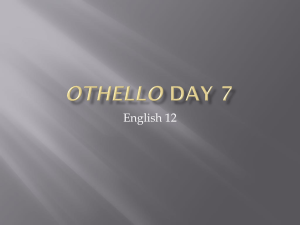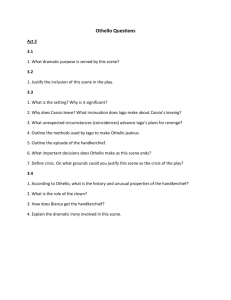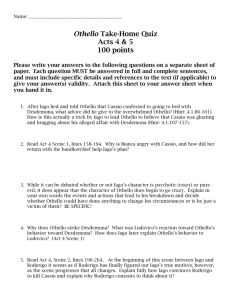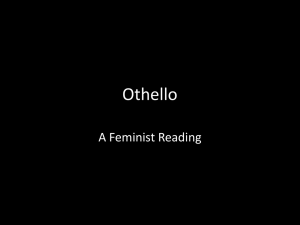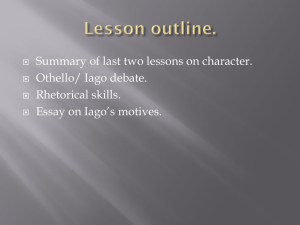Othello Act 5 Worksheet: Plot, Characters, and Quotes
advertisement
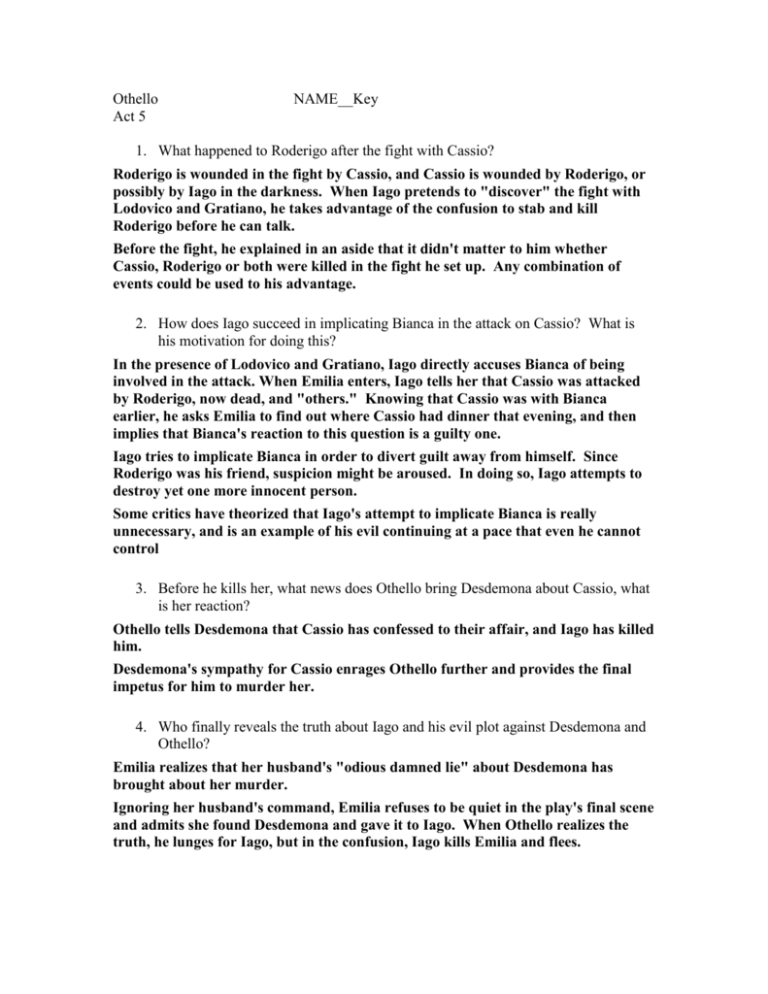
Othello Act 5 NAME__Key 1. What happened to Roderigo after the fight with Cassio? Roderigo is wounded in the fight by Cassio, and Cassio is wounded by Roderigo, or possibly by Iago in the darkness. When Iago pretends to "discover" the fight with Lodovico and Gratiano, he takes advantage of the confusion to stab and kill Roderigo before he can talk. Before the fight, he explained in an aside that it didn't matter to him whether Cassio, Roderigo or both were killed in the fight he set up. Any combination of events could be used to his advantage. 2. How does Iago succeed in implicating Bianca in the attack on Cassio? What is his motivation for doing this? In the presence of Lodovico and Gratiano, Iago directly accuses Bianca of being involved in the attack. When Emilia enters, Iago tells her that Cassio was attacked by Roderigo, now dead, and "others." Knowing that Cassio was with Bianca earlier, he asks Emilia to find out where Cassio had dinner that evening, and then implies that Bianca's reaction to this question is a guilty one. Iago tries to implicate Bianca in order to divert guilt away from himself. Since Roderigo was his friend, suspicion might be aroused. In doing so, Iago attempts to destroy yet one more innocent person. Some critics have theorized that Iago's attempt to implicate Bianca is really unnecessary, and is an example of his evil continuing at a pace that even he cannot control 3. Before he kills her, what news does Othello bring Desdemona about Cassio, what is her reaction? Othello tells Desdemona that Cassio has confessed to their affair, and Iago has killed him. Desdemona's sympathy for Cassio enrages Othello further and provides the final impetus for him to murder her. 4. Who finally reveals the truth about Iago and his evil plot against Desdemona and Othello? Emilia realizes that her husband's "odious damned lie" about Desdemona has brought about her murder. Ignoring her husband's command, Emilia refuses to be quiet in the play's final scene and admits she found Desdemona and gave it to Iago. When Othello realizes the truth, he lunges for Iago, but in the confusion, Iago kills Emilia and flees. 5. What happened to Brabantio? Gratiano (Desdemona's uncle) reports that Brabantio died of grief over his daughter's marriage to Othello. Gratiano is relieved that Brabantio did not live long enough to hear of his daughter's murder. 6. What is Iago’s response when Othello asks him the reason for his evil acts? Iago refuses to answer Othello, providing no reason for his evil actions. His last words in the play are: "Demand me nothing. What you know, you know. From this time forth I never will speak word." Who said it and what does it mean? 7. “He hath a daily beauty in his life that makes me ugly.” Iago provides a general motivation for hating Cassio, prior to the fight between him and Roderigo. Now that Iago has replaced Cassio as Othello's lieutenant, his specific reason for destroying Cassio has been removed. Iago's general jealousy of those held in public esteem provides a motivation for his destruction of Cassio, but may also be one of the reasons for his plot against Othello and Desdemona. 8. “O damned Iago! O inhuman dog!” Roderigo's last words before Iago stabs him. He realizes that he has been duped by Iago all along, but it is now too late. 9. “It is the cause, it is the cause, my soul. Let me not name it to you, you chaste stars.” The opening lines of Act V, Scene 2--the scene in which Othello murders Desdemona. At Othello enters his wife's bed chamber, he repeats the word "cause," emphasizing that the act he is about to commit is an act of justice. He considers the "cause" for his action so foul that he cannot even name it in the presence of the "chaste stars." Othello's tortured psychological state is obvious here, as he prepares himself mentally to kill the woman he still loves. In repeating "the cause," he almost seems to be trying to convince himself that there is a just reason for committing this murder. 10. “Commend me to my kind lord. O, farewell.” In her last words, Desdemona conveys her love for Othello by trying to exonerate him. Desdemona's dying words emphasize the goodness of her nature. Even in her last breath, she is not capable of condemning her own murderer. 11. “When you shall these unlucky deeds relate, Speak of me as I am… Of one that loved not wisely, but too well.” In his final speech, Othello tries to control how he will be remembered. He describes himself as someone who loved too intensely, someone who was a victim of jealousy in the "extreme," and someone who threw away a "jewel," not realizing its value. Othello's final speech beautifully sums up his tragic situation and distracts his audience long enough for him to stab himself with a hidden weapon. His ability to charm an audience with his "rude speech" recalls how he originally wooed Desdemona with tales of his life.



